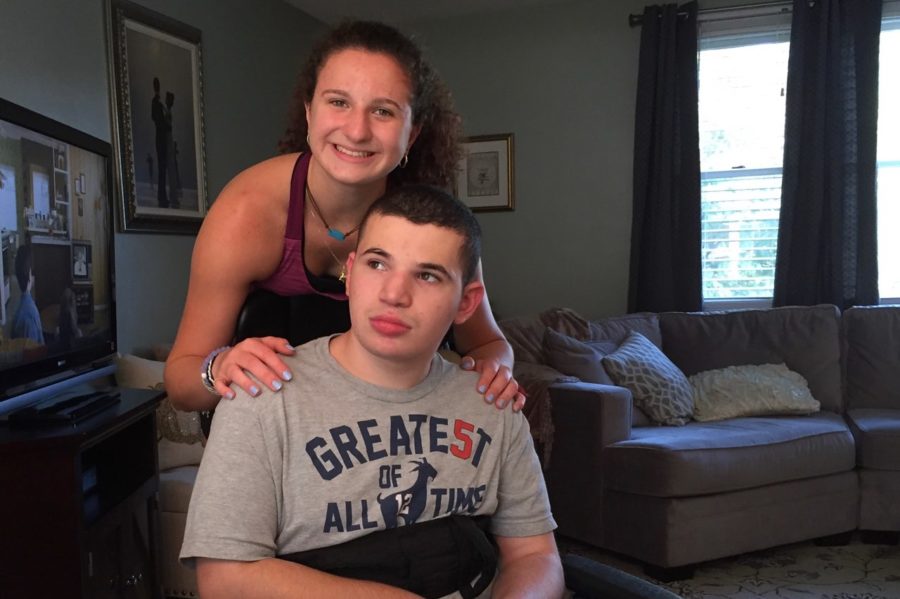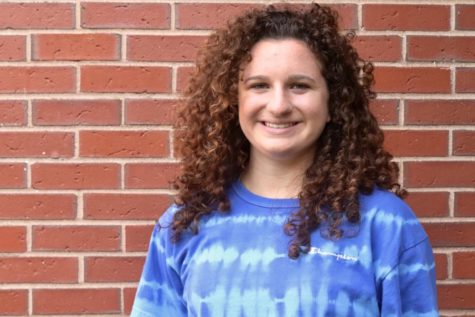Opinion: Living with a sibling with special needs
Credit: Caterina Tomassini
WSPN’s Caterina Tomassini with her older brother Michael. Michael has autism and epilepsy and is nonverbal.
June 14, 2018
For most people, having a sibling means fighting over the TV remote, having someone to play outside with and sharing endless inside jokes. But not for me. For me, my sibling is someone I watch over, learn from and share unique moments with.
My brother, Michael, is 18 and has special needs. He has autism and epilepsy, and he is nonverbal, meaning that he cannot talk. Although we never fight and we never got to play outside together as kids, we have our own ways to communicate and have fun.
Sometimes I grow frustrated when Michael starts a new self-stimulatory behavior — also known as a stim — which often includes repetition of physical movements, words or sounds. He repeatedly blows raspberries all day, which drives me up a wall. And when I say all day, I mean all day! It’s hard to not be angry at him, but I know that he can’t help it, so I have to refrain from yelling at him.
Try putting yourself in my shoes. I have no idea what it’s like to have a typical sibling, just like you probably can’t imagine what it’s like to have a sibling with special needs. You probably can’t see yourself pushing your brother’s or sister’s wheelchair in the store just like I can’t imagine asking Michael to pass the salad at dinner.
Even though there are some aspects of having a sibling with special needs that are hard, there are surely a whole bunch of great things.
I get to experience some pretty unique things that siblings of typical kids don’t get to experience. How many people get to go to physical or occupational therapy with their sibling and play with fun equipment like swings and bouncy yoga balls? Or how about this: I get to learn new signs in sign language like ‘eat’ or ‘bathroom’ to better communicate.
We’ve had dozens of Patient Care Assistants, or PCAs, come to our house to help Michael with everyday activities, so I’ve made friends with truly interesting and different people. We also get to attend events for other kids with special needs and their families, where I’m exposed to a variety of different kids who ranging from being mildly autistic to having severe cerebral palsy. And do you know what’s really fun? The fact that when we go to Canobie Lake Park, we get to cut all the lines because Michael is in a wheelchair.
But besides all of the fun aspects, I’ve learned important life lessons.
My brother requires extra attention on a daily basis, which has helped me learn patience. Michael doesn’t attend a public school. Instead, he goes to a school that specializes in kids with disabilities. At his school, they don’t learn math equations or write essays. That has helped me understand other kids at WHS who can’t comprehend school concepts as easily as others.
Many people don’t understand why some kids are in wheelchairs, and they make fun of serious medical terms such as seizures. Instead of being angry at the people who make those terribly rude comments, I understand and accept that those people don’t have the same kind of exposure and understanding that I do. When I hear people make those comments, I like to (nicely) educate them on the topic and explain that it’s not a funny joke.
In case you didn’t notice, at the beginning of this article, I said that my brother has special needs. I didn’t say that he is disabled. The reason for this is simple: my brother is very much ‘abled.’ He may not be capable of getting dressed on his own or getting a driver’s license, but he is more than capable of putting a smile on the face of anybody he meets.
So, if you are going to take one thing away from this article, I ask that it be this: do not use the word “retarded” under any circumstances. This word is one that I wish I could eliminate from people’s vocabulary. This word hurts not only me and all the people who are lucky enough to have a person with special needs in their life but also all the people out there who have special needs.
The last thing that I ask is that you don’t take being able to do everyday activities for granted. Take some time to appreciate how fortunate you are that you can brush your own teeth, play a sport and simply use your voice. Try to think of all the kids out there who spend endless hours in the hospital receiving medical treatment and how lucky you are that that’s not you. Next time you see a person with special needs, think about all that I’ve said. Maybe you could even take some time to make a friend with people who have special needs; it would make their day and probably yours, too.
Opinion articles written by staff members represent their personal views. The opinions expressed do not necessarily represent WSPN as a publication.





![Last Wednesday, the Wayland School Committee gathered to discuss a number of topics regarding the health curriculum and Innovation Career Pathway course. Another large topic of conversation was the ways to potentially mitigate distracting cell phone usage. "These [phones] are going to distract your learning and social relationships," Superintendent David Fleishman said. "That's concrete right there."](https://waylandstudentpress.com/wp-content/uploads/2025/06/Screenshot-2025-06-04-at-9.49.31 PM-1200x886.png)



























![Troy Hoyt finishes the Boston Marathon, running for the Hoyt Foundation. T. Hoyt is the son of Hoyt Foundation CEO Russ Hoyt.
“[Running a marathon] might seem like a big thing, when it’s presented to you at first, but if you break it up and just keep telling yourself, “Yes, you can,” you can start chipping away at it. And before you know it, you’ll be running the whole 26 miles, and you won’t even think twice about it.” T. Hoyt said.](https://waylandstudentpress.com/wp-content/uploads/2025/04/C36E8761-1CBB-452E-9DF2-543EF7B1095E_1_105_c.jpeg)














































Inspired • Jun 14, 2018 at 5:55 PM
Amazing article Caterina!!